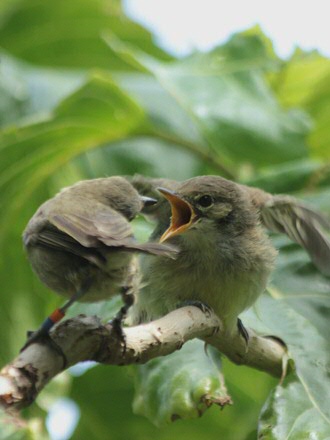Kroostloze vogels helpen soortgenoten bij opvoeding, maar niet belangeloos
Vogels zorgen voor het nageslacht van soortgenoten wanneer daaraan in de toekomst een voordeel kleeft. Acceptatie in andermans territorium en de kans dat territorium later te erven zijn beloningen waarvoor sommige vogels de eigen kans op voortplanting een tijdje laten schieten. Hierover publiceerde Sjouke Kingma, Veni-onderzoeker aan de Rijksuniversiteit Groningen, op 23 oktober 2017 in Nature Communications.

In bijna tien procent van de vogelsoorten wereldwijd stellen sommige individuen de eigen kans tot voortplanting uit om soortgenoten te helpen bij de zorg voor hun nageslacht. Dit gedrag komt ook voor bij sommige zoogdieren, vissen en insecten. Maar al sinds de tijd van Charles Darwin gaan biologen ervan uit dat alle dieren zelfzuchtig zijn: ze streven hun eigenbelang na omwille van een zo groot mogelijke kans de eigen genen aan het nageslacht te kunnen doorgeven. Waarom offeren sommige vogels zich dan op door andere te helpen? Er moeten voordelen zijn aan zelf niet broeden en energie verspillen aan het helpen van anderen.
Familieleden
Eén hypothese is dat ze alleen verwante familieleden helpen, jongere broers en zussen waarmee ze veel dezelfde genen delen. Zo worden de eigen genen toch doorgegeven ondanks dat de helpers zelf zich niet voortplanten. Evolutionair bioloog Sjouke Kingma bestrijdt die algemeen geaccepteerde visie in een recente studie door aan te tonen dat individuen ook meehelpen met het vooruitzicht op toekomstig persoonlijk voordeel. Kingma vergeleek 44 vogelsoorten waar sommige kroostloze vogels andere helpen. Weliswaar helpen sommige vogels alleen de eigen familieleden, maar vele hielpen niet-familieleden juist veel meer als ze in de toekomst hun territorium kunnen erven.
Territorium
Kingma concludeert: ‘Voor vogels is een territorium net zoiets als een huis. Bij sommige soorten staan de “huiseigenaren” het toe dat andere in hun territorium leven en dat de extra bewoners helpen bij de verzorging van het nageslacht van de huiseigenaar. Het is misschien logisch dat ze elkaar helpen wanneer alle vogels in het territorium familie zijn van elkaar. Maar vaak ook zijn ze dat niet.
Mijn onderzoek toont aan dat de huiseigenaren veel meer hulp krijgen als de helpers in de toekomst het territorium kunnen erven. Als je weet dat je later een huis erft, dan ben je geneigd de huidige eigenaar te helpen in het onderhoud ervan. Precies dat doen veel vogels: help de huidige eigenaar zodat het territorium later meer waard is als je het erft.’
Toekomstige hulptroepen
Kingma ziet twee manieren waarop dit principe werkt. ‘Tonen dat je hulpvaardig bent vergroot de kans dat het broedpaar je tolereert in het territorium zodat je later misschien wel het territorium kunt erven. Daarbij, als je de koters van de huidige eigenaar helpt, dan creëer je je eigen toekomstige hulptroepen. Tegen de tijd van de overdracht van het territorium beschikt de hulpvaardige vogel al over een team van jonge vogels dat hem wil helpen.’
Plannen
Het idee van elkaar helpen lijkt voor de mens misschien niet zo vreemd, maar waarom wilde dieren dit doen was tijdenlang een raadsel voor biologen. Dit onderzoek toont aan dat dieren kunnen plannen en hun gedrag kunnen aanpassen aan doelen in de toekomst.
Meer informatie
- Direct benefits explain interspecific variation in helping behaviour among cooperatively breeding birds , Nature Communications, 23 oktober 2017; DOI 10.1038/s41467-017-01299-5.
- Contact: Dr. Sjouke Kingma , GELIFES — Groningen Institute for Evolutionary Life Sciences van de Rijksuniversiteit Groningen, www.rug.nl/staff/s.a.kingma
- Het onderzoek van Kingma werd gefinancierd met een Veni-beurs van NWO.
Meer nieuws
-
17 februari 2026
De lange zoektocht naar nieuwe fysica
-
10 februari 2026
Waarom slechts een klein aantal planeten geschikt is voor leven
